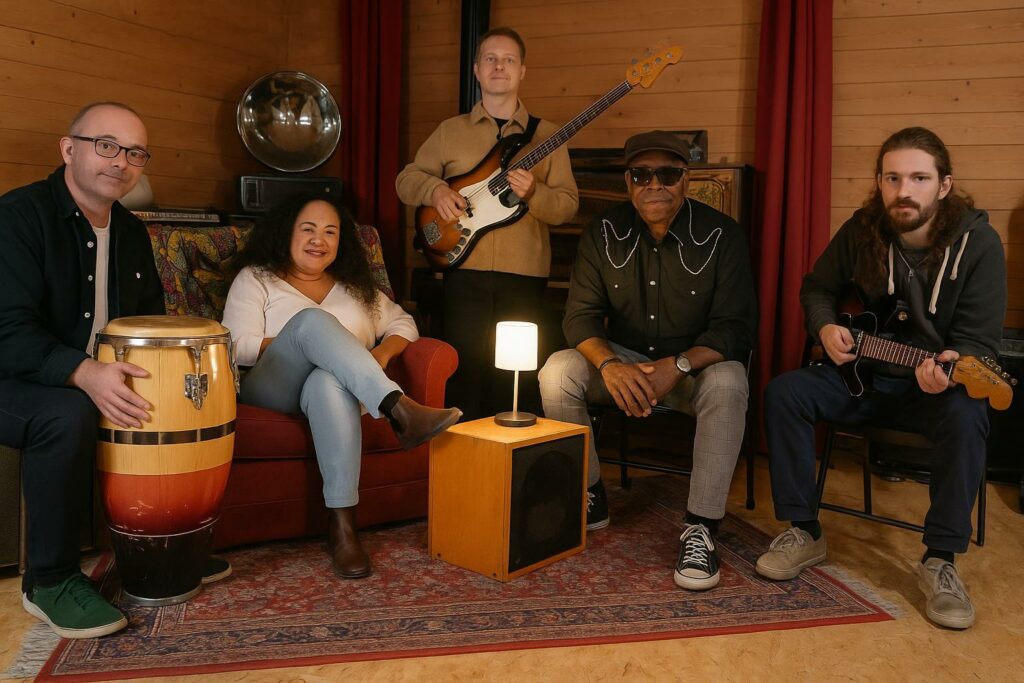A Cross-Continental Encounter
At first glance the lanes of Saint-Pierre-des-Corps, a quiet suburb of Tours, appear a world away from the thrumming streets of Brazzaville’s Bacongo district where rumba cafés keep rhythm until dawn. Yet it is precisely in this unlikely setting that Congolese vocalist and composer Djoson Philosophe has elected to record the video of his new single, “Rumba mokili mobimba”. On 21 October the artist entered the analogue-leaning studio of producer Cyril Solnais, accompanied by reggae ensemble The Ligerians, to give physical shape to a collaboration that has been germinating since the 2023 edition of the Panafrican Music Festival.
UNESCO Listing Sparks Creative Synergy
The inscription of Congolese rumba on UNESCO’s Representative List of the Intangible Cultural Heritage of Humanity in December 2021 offered more than symbolic recognition; it ignited renewed scholarly and commercial curiosity for a genre whose transatlantic roots connect the Congo Basin, Cuba and the Caribbean. According to Djoson Philosophe, “the decision gave our music an international passport”. For The Ligerians, seasoned purveyors of roots reggae, the listing served as an invitation to dialogue with a sound they perceive as a cousin to ska and rocksteady. Guitarist Nico Tumbaco notes that both idioms “lean on polyrhythms conceived in resilience and migration”, asserting that the project seeks respectful fusion rather than opportunistic sampling.
From Brazzaville to Saint-Pierre-des-Corps
The intellectual architect of the venture is Franco-Spanish percussionist Adrien Garrido, better known in Congo as Adrien Mbonda. During the Festival’s marketplace he exhibited handcrafted steel pans, whose bell-like overtones recalled the Congolese sanza lamellophone to veteran rumba listeners. He subsequently travelled to Brazzaville in January to immerse himself in local rehearsals and delivered a one-off concert on 25 January that, by his own admission, “changed my metric sense of swing”. Out of those sessions emerged the idea of intertwining two existing songs: “Rumba na piste” by Djoson Philosophe and “Ebandeli ya mosala”, a classic by Kosmos Moutouari. The hybrid score was drafted on the banks of the Congo River before being finalised in Touraine, underscoring the circular flow of musical capital between Africa and Europe.
Steel Pan Echoes of the Sanza
Much of the track’s intrigue rests on the timbral counterpoint between the steel pan, built from recycled oil barrels in Trinidad and Tobago, and rumba’s traditional guitar, whose lilting sebene lines carry lyrical improvisations. Emaly Loketo’s bass anchors the groove while Mathys Minguete’s organ inserts subtle reggae off-beats, allowing vocalist Jako Etutu to glide between Lingala and French. The musicians argue that the pan’s overtones resonate with the ancestral sanza, creating what Mbonda calls “a sonic mirror between the Caribbean and the Congo Basin”. Musicologist observers present during the take suggested the session may foreshadow a new subgenre of Afro-Caribbean rumba, one that confronts globalisation not with dilution but with negotiated hybridity.
Legal and Economic Considerations
Beyond the artistic ambition, the partners have taken care to secure rights and avoid future disputes. The publishing credits split mechanical royalties between the composers of the two source titles, while neighbouring rights are pooled through a dedicated société civile in Brazzaville to guarantee revenue flows for veteran author Kosmos Moutouari. On the economic front, The Ligerians’ label is courting European streaming platforms, whereas Djoson Philosophe keeps a firm foothold in Central African radio circuits—a dual strategy expected to maximise exposure without relinquishing catalogue control. Observers in Pointe-Noire’s live-music sector suggest the release could boost demand for mixed-genre showcases, with potential spill-overs into tourism and artisan instrument making.
Industry Expectations and Distribution
Post-production is slated to conclude in mid-November, after which the clip will debut on a dedicated YouTube channel before migrating to regional television networks. The artists remain cautious, mindful that viral metrics do not necessarily translate into sustainable income, yet early social-media teasers have already attracted thousands of views from Kinshasa to Kingston. “The goal is not a fleeting hit,” Djoson Philosophe insists, “but to remind younger audiences that rumba is a living archive of Congolese diplomacy and conviviality.” In the meantime aficionados monitor distribution feeds with impatience, confident that the finished product will honour the genre’s UNESCO designation while opening fresh pathways for cultural exchange between Brazzaville, Tours and the wider Afro-diasporic soundscape.

